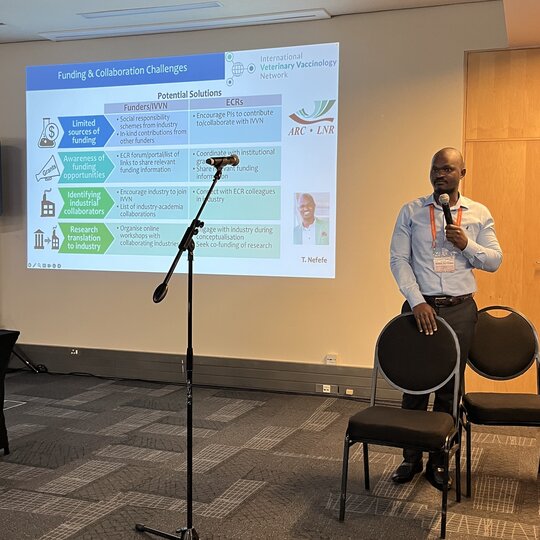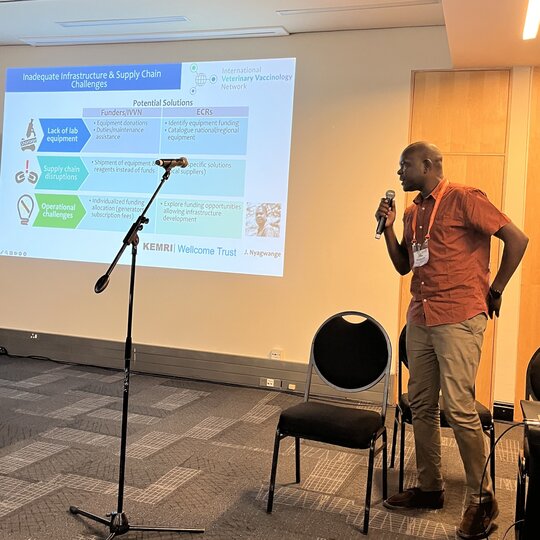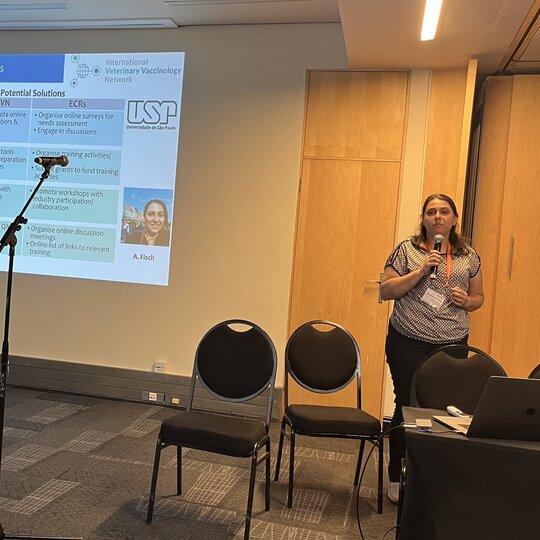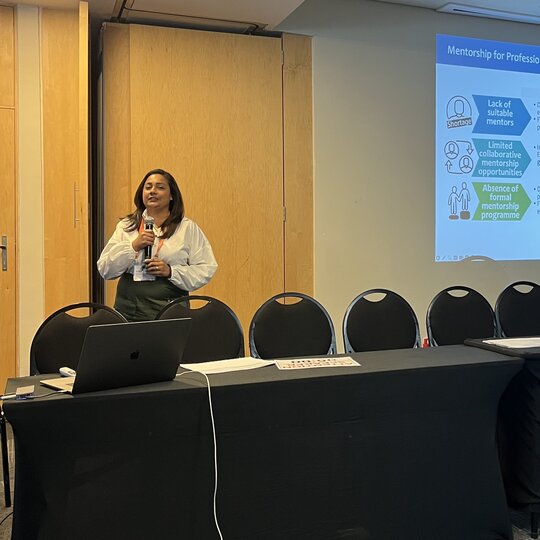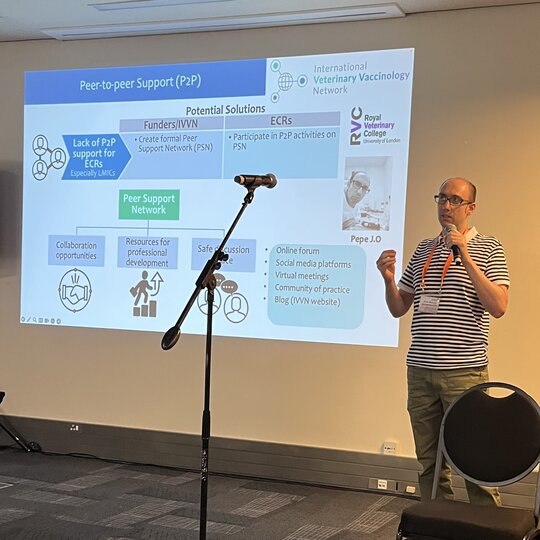IVVN Workshop at IVIS 2023: Empowering Early Career Researchers in Veterinary Vaccinology
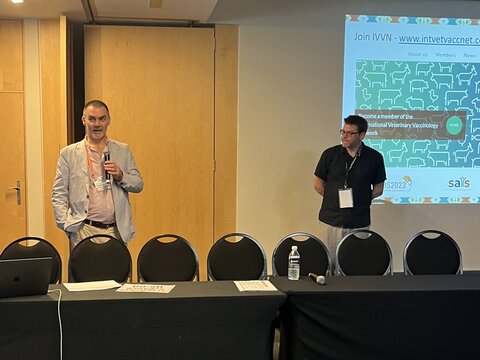
On 21 November 2023, the International Veterinary Vaccinology Network (IVVN) hosted a workshop at the 13th International Veterinary Immunology Symposium (IVIS) which took place in Kruger National Park, South Africa. Led by Dr Tim Connelley (IVVN Director) and Professor Simon Graham (IVVN Co-Director), the workshop delved into strategies for supporting early career researchers (ECRs) engaged in veterinary immunology and vaccinology research.
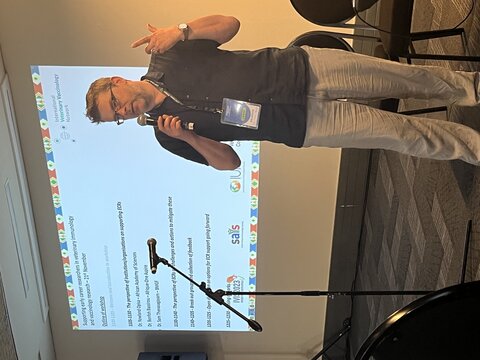
Dr Connelley kicked off the session by introducing IVVN's mission: supporting the international veterinary vaccinology community by creating opportunities for collaborative research with the aim of designing vaccines for livestock and zoonotic diseases of importance in low-and-middle income countries (LMICs). He emphasised the growing need for supporting ECRs and highlighted IVVN’s Early Career Researcher Event hosted in March 2023 which brought together 20 ECRs from 11 countries. Building on the success of this event, IVVN have continued to engage with the group of ECRs and have been developing a white paper to guide future strategy.
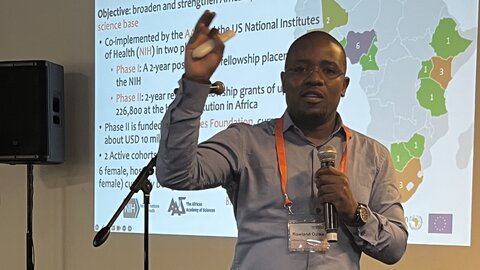
IVVN’s workshop at IVIS aimed to present findings from the white paper and to gather insights from invited speakers and the wider scientific community. Three distinguished speakers were invited to share their perspectives on supporting ECRs: Dr Rowland Opisa from the African Academy of Sciences (AAS), Dr Bassirou Bonfoh from Afrique One-ASPIRE, and Dr Samuel Thevasagayam from the Bill and Melinda Gates Foundation (BMGF).
Dr Rowland Opisa, representing AAS, stated that they are the sole African Union mandated organisation, and they are dedicated to supporting research in Africa. Dr Opisa provided details on programs like ASPIRE-PP and APTI, designed to assist early-to mid-career African researchers through grants, fellowships, and capacity-building initiatives. He highlighted successful ECR support strategies, including grant awards, fellow and affiliate initiatives, capacity strengthening, AAS mentorship and scientific conferences. He also candidly addressed challenges, citing systemic issues, limited matching funding opportunities, capacity gaps, a tendency for researchers to work outside Africa, and economic constraints in the continent.

The next speaker, Dr Bassirou Bonfoh from Afrique One, began by explaining that their organisation functions as a consortium with a primary focus on capacity building in Africa. Dr. Bonfoh provided detailed insights into two programs: Afrique One-ASPIRE for postdoctoral fellows and the more recent Afrique One-REACH, extending training to Masters and PhD fellows.They undergo comprehensive training covering governance, competitive scientific leadership, focused research in specific areas, and the dissemination of findings to communities and policymakers. Dr Bonfoh concluded by highlighting crucial factors for enhancing the development and capacity building of the next generation of researchers, especially in vaccinology. These factors include the implementation of a long-term funding scheme, fostering partnerships between regions, countries, and institutions to ensure shared infrastructure and resources, and more. He underscored the importance of viewing the training of ECRs) as a long-term initiative, recognising that a short-term perspective may not facilitate meaningful progress.

The third speaker, Dr Samuel Thevasagayam from BMGF began by highlighting the foundation's role in providing funding for targeted capacity -building programs. The primary objective is to drive policy change by disseminating relevant knowledge. Dr Thevasagayam highlighted challenges encountered over the years, such as the limitations of non-targeted funding. In such instances, individuals with Master's or PhD degrees are trained, but the outcomes may not contribute to policy change or societal improvement as anticipated. Another challenge outlined by Dr. Thevasagayam is the trend of many trainees expressing a desire to leave Africa after completing their training. Those who return often encounter the hurdle of the technologies they were trained on overseas not being readily available in Africa, leading to a lack of continuity. In conclusion, he shared that one strategy the foundation is employing to address these challenges is a more targeted approach. As funders, they are selecting areas closely aligned with priority problems, aiming for a more focused and impactful intervention.
After the informative talks, the floor was given to five ECRs who shared the challenges identified during IVVN’s ECR event in March 2023 and proposed solutions. Dr Tshifhiwa Nefefe from the Agricultural Research Council (ARC) discussed the difficulties in securing funding and establishing collaborations with the industry. Following this, Dr James Nyagwange from the Kenyan Medical Research Institute (KEMRI-Wellcome Trust) and The Pirbright Institute addressed challenges related to inadequate infrastructure and supply chain issues in many LMICs. Dr Andressa Fisch from the Ribeirão Preto College of Nursing talked about the limited training opportunities for ECRs, which is a crucial aspect of professional development. Dr Uraisha Magan from the University of Pretoria discussed the need for mentorship to foster both professional and personal growth, while Dr Jose Manuel Jaramillo-Ortiz from the Royal Veterinary College highlighted the importance of peer-to-peer support in overcoming challenges.
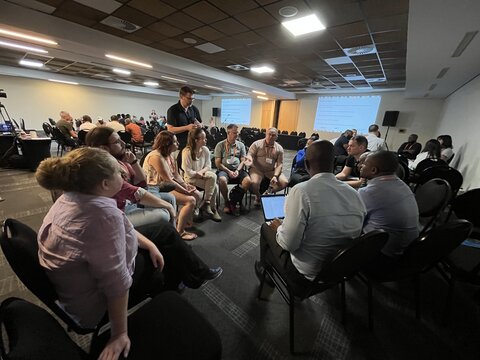
The presentations were followed by group discussions, where participants actively explored the challenges presented by the ECRs and brainstormed potential solutions. This collaborative dialogue provided a platform for meaningful interactions and problem solving within the veterinary vaccinology community.
The IVVN's commitment to fostering collaboration, addressing challenges, and supporting the next generation of veterinary vaccinologists was evident throughout the workshop. As the network continues to evolve, such initiatives play a pivotal role in shaping the future of veterinary vaccinology research on a global scale.
